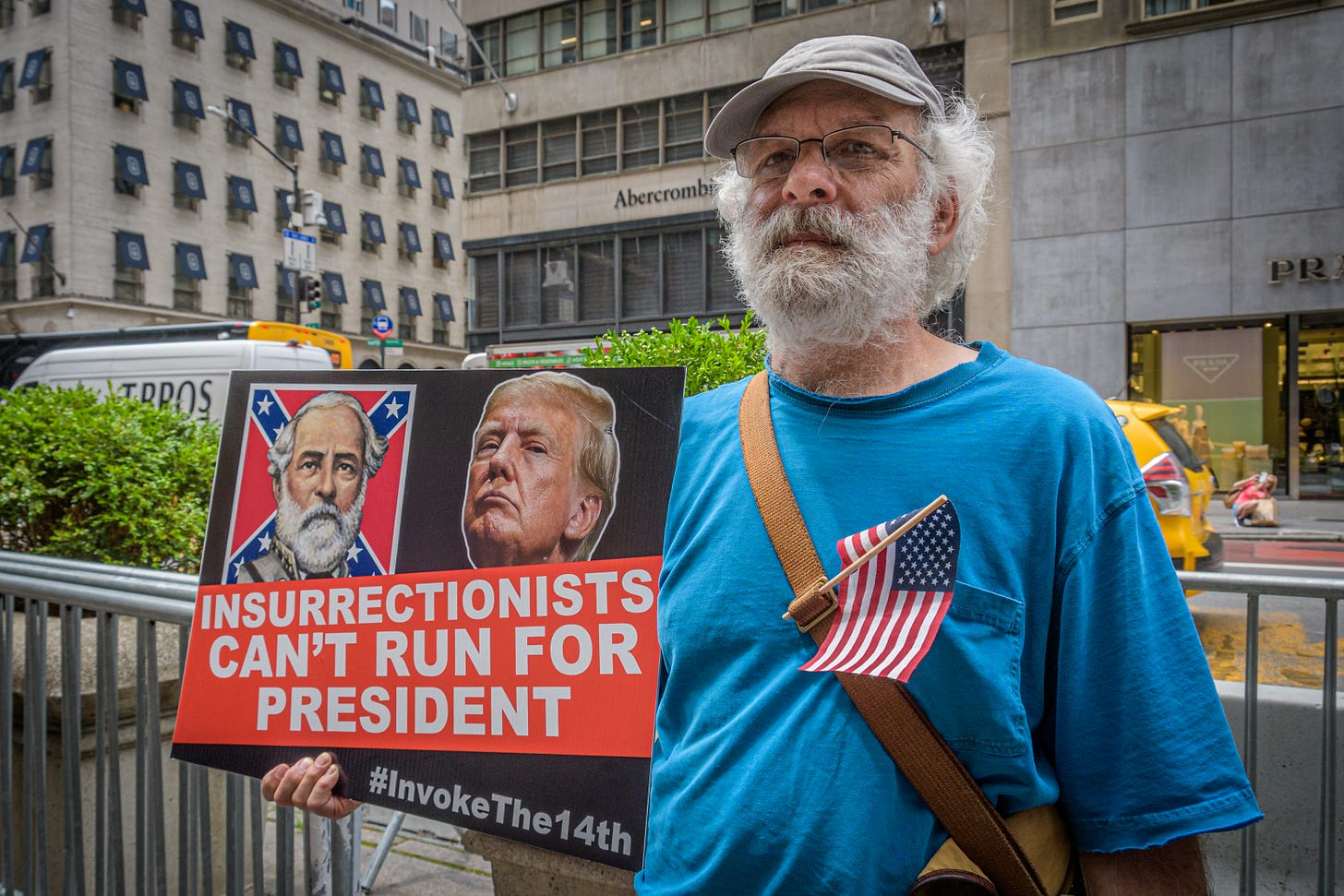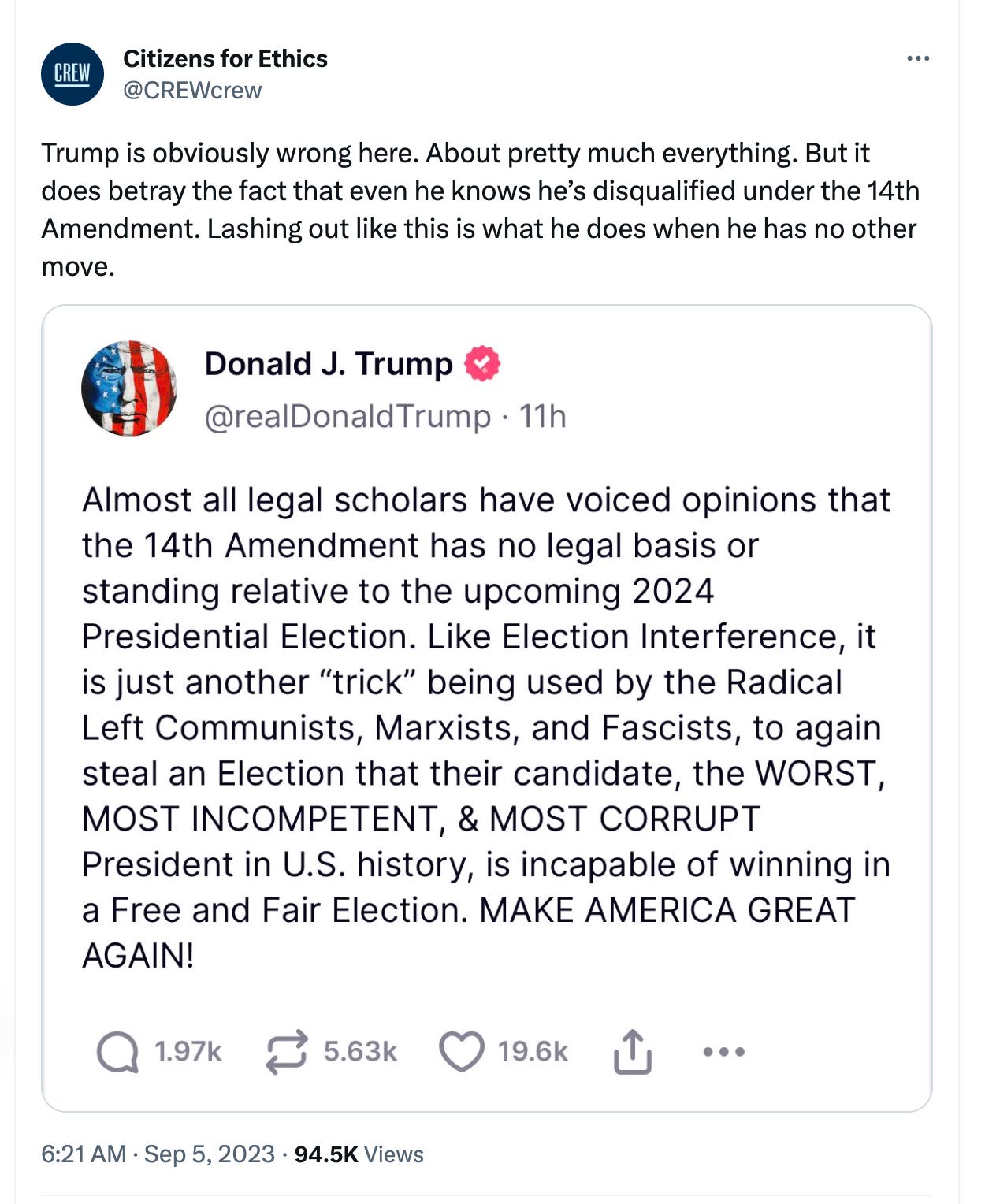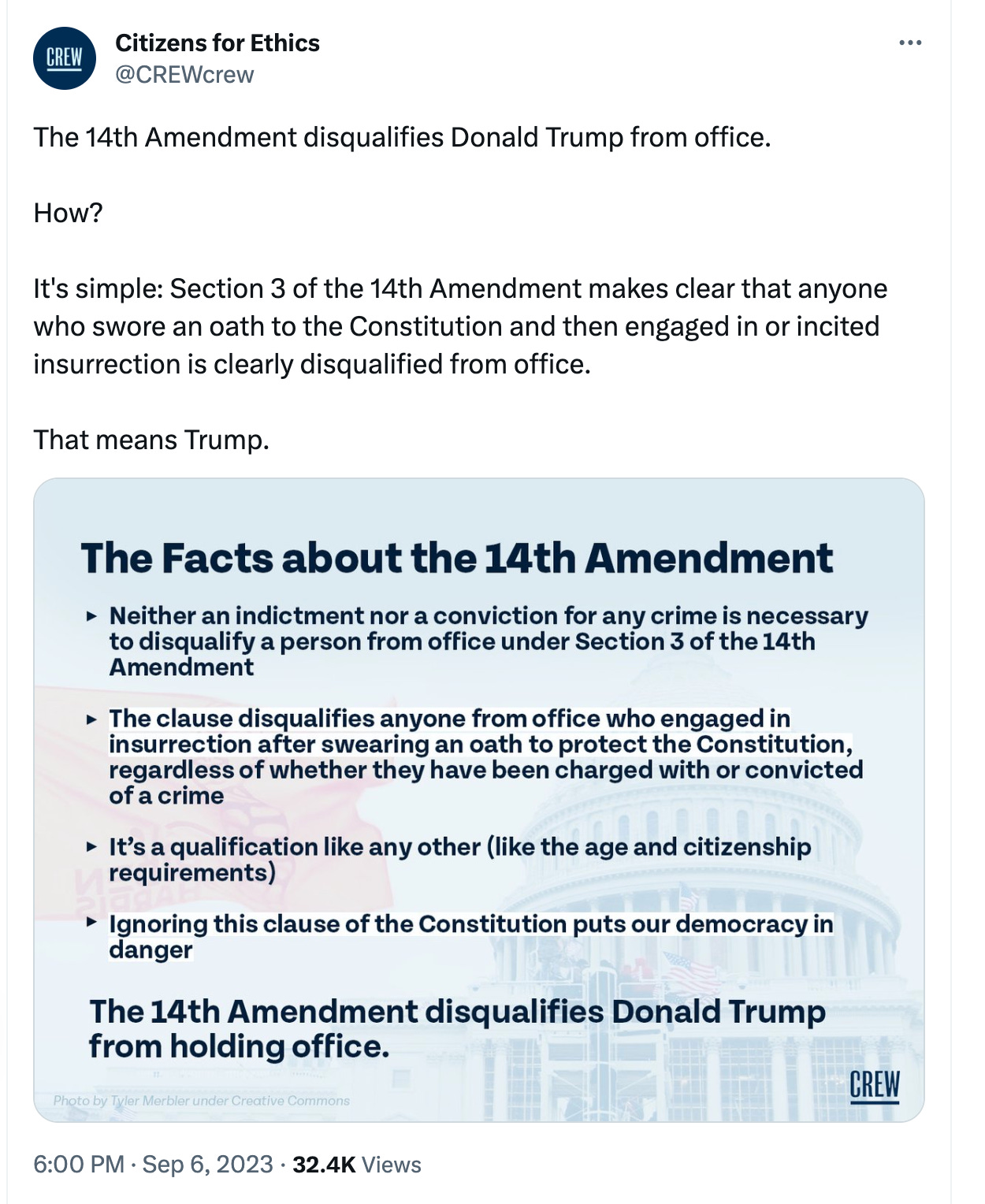The surprisingly strong constitutional case for Trump's disqualification
The 14th Amendment is quite clear that insurrectionists can't hold office.

Public Notice is made possible by paid subscribers. If you appreciate our work and aren’t already one, please support us by signing up. Just click the button below for a free trial.
Citizens for Responsibility and Ethics in Washington (CREW) sued earlier this week to keep Donald Trump off the presidential ballot in Colorado. It’s the first state lawsuit of its sort, but it won’t be the last. And the case for disqualifying Trump is stronger than you might think.
The argument is rooted in Section 3 of the 14th Amendment — also known as the Disqualification Clause — which states that anyone who took an oath “to support the Constitution” but then “engaged in insurrection or a rebellion” shall not “hold any office, civil or military.” It was adopted in 1868 as a way to block unrepentant ex-Confederates from government, then was mostly forgotten for about 150 years — until January 6.
In July, CREW released a detailed report making the case that Trump’s efforts to overturn his loss to President Biden meet the bar of engaging in insurrection, and hence for constitutional disqualification. This isn’t some desperate liberal Hail Mary. Two prominent conservative law professors, William Baude and Michael Stokes Paulsen, recently authored a paper arguing that Section 3 “disqualifies former President Donald Trump, and potentially many others, because of their participation in the attempted overthrow of the 2020 presidential election.” Secretaries of state in a range of states, including battlegrounds like Arizona and Michigan, have already indicated they plan to take seriously potential 14th Amendment challenges. And a precedent was established last year when a state judge in New Mexico removed country commissioner Couy Griffin from office, citing the 14th Amendment and Griffin’s participation in January 6.
RELATE FROM PN: Trump's J6 indictment isn't about his words. It's about his deeds.
While the text of the Constitution is very clear, there are at least a few obvious counterarguments to CREW’s position. One is a principled case that the decision to reject or elect Trump should be left to voters, not the courts. The second is procedural. Trump would obviously appeal any state-level decision to disqualify him all the way to SCOTUS, and it’s hard to imagine a court he stacked ultimately ruling against him. Finally, the 14th Amendment was adopted in the wake of a very bloody four-year-long Civil War, and it’s debatable whether Trump’s leading role in the January 6 attack rises to that level of “insurrection.”
It may be a long shot, but Trump is concerned enough about the 14th Amendment that he’s recently posted a series of lie-filled Truth Social diatribes about it.
To go deeper on the 14th Amendment case for disqualifying Trump, Public Notice contributor Thor Benson connected with CREW President Noah Bookbinder.
“It’s important to remember that the Constitution is not optional,” Bookbinder told us, adding that there’s “a certain irony in the argument that it’s anti-democratic to take somebody off the ballot.”
“What happened after the 2020 election, and particularly on January 6, was an effort to overturn the results of an election, to disregard the votes of millions of Americans,” he added. “There’s nothing more anti-democratic than that.”
A full transcript of the conversation, lightly edited for clarity and length, follows.
A note from Aaron: Working with brilliant contributors like Thor requires resources. To support this work, please click the button below and take advantage of my special offer — free trials for all new signups.
Thor Benson
Could you start by telling us a little about this section of the 14th Amendment, why it exists and how it’s been used?
Noah Bookbinder
In the aftermath of the Civil War, the framers of the 14th Amendment wanted to make sure that people who had risen up against the country and democracy were not put back in charge of it, in a position where they could easily do it again. So they included in the 14th Amendment, which obviously has much more famous provisions, a Section 3 essentially saying that anyone who swore an oath to support the Constitution and then engaged in insurrection is disqualified from state or federal office.
In the aftermath of the 14th Amendment being adopted, it was mostly just understood that Section 3 was the rule, and people who had been involved in the Confederate cause didn’t try to serve in the US government. Some did, and there was litigation, and a number of people were disqualified in court. After a period of time, Congress issued a general amnesty for people who had been part of the Confederacy and sort of closed that chapter.
Thankfully, for 150 years we didn’t have any insurrections in this country, so this provision was mostly not used. But I think the framers of the 14th Amendment understood that this might not be a one-time thing. It could happen again.
In the wake of the attempt to overturn a democratic election in 2020 and early 2021, it became clear that we are in the moment that the people who wrote this provision envisioned. Now is the time to make it relevant again.
Thor Benson
There might be a legitimate constitutional argument here, but what do you say to people who say it’s anti-democratic?
Noah Bookbinder
There’s a certain irony in the argument that it’s anti-democratic to take somebody off the ballot — that everybody should be able to vote for the candidate of their choice. What happened after the 2020 election, and particularly on January 6, was an effort to overturn the results of an election, to disregard the votes of millions of Americans. There’s nothing more anti-democratic than that.
In fact, it seems counterintuitive to say it’s not fair to not let Donald Trump be on the ballot — that he should be defeated at the ballot box — because of course he was defeated and refused to accept it, and it led to a violent insurrection. There’s no particular reason to assume it’d go differently next time.
Want to read this full post but aren’t a paid subscriber? Just click the button below for a free trial of Public Notice.
Thor Benson
What about the argument that trying to disqualify Trump could end up being a political gift to him?
Noah Bookbinder
It’s important to remember that the Constitution is not optional. These aren’t rules to put into place if you feel like it or it’s politically helpful. This is the law of the land — just like how the Constitution says you have to be 35 to be president. If you have a 23-year-old running for president, you don’t think about whether it’s politically helpful or not to disqualify that person.
It’s the same thing. I’d even go a little bit further to say that that this provision was meant exactly for this kind of moment. If you don’t enforce it, if you don’t use it now, my concern is that it’s going to become a dead letter. This protection for our democratic system that these really prescient and important leaders thought to put in place more than 150 years ago is going to drop away, and we’re not going to have it going forward. That’s not something we want.
Thor Benson
I can imagine a debate over if Trump qualifies here. He hasn’t actually been charged with being part of an insurrection. Why does his conduct meet the bar?






